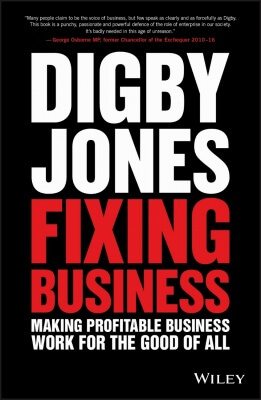Former Minister of State for UK Trade & Investment
View Author Profile“It takes 20 years to build a reputation and five minutes to ruin it. If you think about that, you’ll do things differently.” - Warren Buffett
Opinions
Fixing The Reputation Of Business
“It takes 20 years to build a reputation and five minutes to ruin it. If you think about that, you’ll do things differently.” - Warren Buffett

It is hard to think of a time when the reputation of Business was worse than it is today. It is disastrous, and it really matters.
Perhaps the first thing to say is that Business and its leaders can be their own worst enemies. Often there is too little leadership, or Business is too quick to focus on profit or process, apparently at the expense of customers and wider society.
There are very few Business people who would not consider themselves as being professional in what they do, yet one very good definition of a professional is someone who puts the interest of their client or customer ahead of their own.
I would suggest that this is a definition that would not suit too many Business people.
It is understood by the general public almost subliminally and respect is the first casualty; teachers many years ago and, more recently, junior hospital doctors fell foul of this loss of professionalism in the public’s eyes and their standing has never recovered. Business, sadly but too often deservedly, is seen in the same light.
Undeniably, and perhaps surprisingly, Businesses are sometimes slow to announce progress or success, partly because they may worry about putting their head over the parapet, partly for competitive commercial reasons and partly because they do not feel that branding or publicity matters.
In fact, there is a range of serious, genuine and concerning reasons why the reputation of Business is so tarnished. How often do we see routine examples of Business treating ordinary customers badly, or simply providing a quality of service that the Business itself would hate to receive?
It amazes me that someone somewhere in the Business isn’t saying, “Would I like to be treated like that?” The consequence is that Business falls into the prejudiced maw of politicians who relish the opportunity to give capitalism a good kicking.
One train company that isn’t doing at all well translates into, “Nationalise the lot!” As if running a train operator from the floor of the House of Commons would make for a better railway, or changing the recipient of profit from Business risk-taker to tax-payer would make the politically motivated trades unions accept, for the first time in recorded history, change through the adoption of technology.
There are bad apples, corporate deceit, foolishness and inefficiency, and these combine to feed an anti-Business firestorm fanned by a gleeful press and politicians, both of whom recognize an easy, populist way to boost their own agendas when they see it.
This misses two vital points, however. First, Business needs to get its own house in order: the Business of wealth creation is not only intrinsically decent and honourable and something that can bring out the best in us all; it is, more importantly, essential.
Remember, it is in the DNA of all of us, it is a basic human instinct.
Second, a cynical “glass half empty” view of Business does no one any favours. All of us in society need to develop greater interest in and respect for the achievements of Business and the people working in Business.
Let’s just take one example: the rise of China’s economy since 1980 and its boost to global trade is not only the greatest poverty reduction exercise in history, it has also provided us all with an opportunity to trade and prosper.
Trade is not a zero-sum game; rather, it enriches us all. There may have been many complex, sometimes negative reasons for a vote in support of Brexit, but I prefer to focus on the positive opportunities it provides for Business; notably greater trade with countries like China.
If we can fix the undeniable reputational problems with Business then we will be left a clearer and more powerful force for good. India, America, Australia, Brazil: all are waiting for Business to get stuck in and make the most of greater trading freedom for the UK, resulting in more profits, more UK jobs, and more UK tax income.
This is an edited extract from Fixing Business: Making Profitable Business Work for the Good of All, by Lord Digby Jones (Wiley, 2017).
Most read in Opinions
Trending articles on Opinions
Top articles on Minutehack
Thanks for signing up to Minutehack alerts.
Brilliant editorials heading your way soon.
Okay, Thanks!



